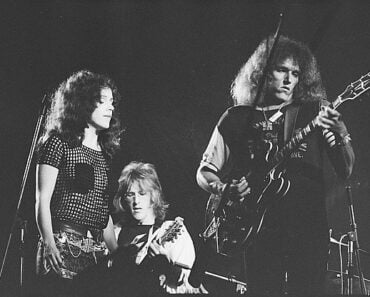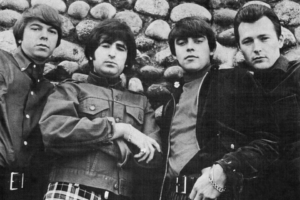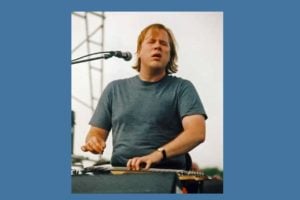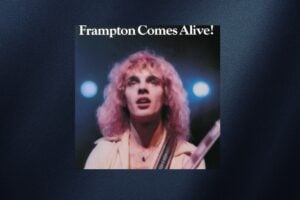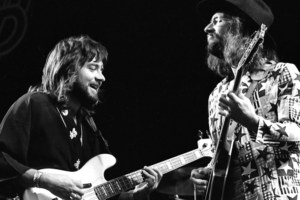
Feature Photo: Arnielee at the English-language Wikipedia, CC BY-SA 3.0 <http://creativecommons.org/licenses/by-sa/3.0/>, via Wikimedia Commons
While most musical partnerships crumble under the weight of ego and ambition, four Detroit teenagers discovered something rare at a 1950s birthday party – a harmony so natural it would endure for nearly half a century. The Four Tops began their journey in 1953 when high school students from different schools found their voices blended perfectly together. Originally calling themselves the Four Aims, the group consisted of Levi Stubbs handling lead vocals, with Abdul “Duke” Fakir, Renaldo “Obie” Benson, and Lawrence Payton providing the harmonic foundation. What started as teenage friends singing at parties evolved into one of Motown’s most consistent hitmaking machines, with the original lineup staying together until death began claiming members in 1997.
The quartet’s early years were marked by struggle and rejection. They changed their name to the Four Tops in 1956 to avoid confusion with the popular Ames Brothers, then spent years bouncing between record labels like Chess, Columbia, and Riverside with little commercial success. Their fortunes transformed dramatically when Berry Gordy brought them to Motown Records in 1963. Paired with the legendary Holland-Dozier-Holland production team, they unleashed a string of classics that defined the Motown sound. Their distinctive approach featured Stubbs’ powerful baritone leading the group, unusual for an era when most male vocal groups featured tenor leads.
The Four Tops achieved remarkable consistency throughout their career, earning induction into the Rock and Roll Hall of Fame in 1990 and receiving a Grammy Lifetime Achievement Award in 2009. Their catalog spans multiple musical eras and genres, from their Motown classics through successful periods with ABC-Dunhill and Casablanca Records. Unlike many groups of their era, they maintained their original lineup for 44 years, only experiencing personnel changes when original members passed away. Today, the group continues performing with new members carrying forward the musical legacy established by the founding quartet.
Levi Stubbs
The powerful voice that defined the Four Tops belonged to Levi Stubbs, born Levi Stubbles on June 6, 1936, in Detroit. His journey with the group began in 1954 when he joined three friends to form the Four Aims, serving as their primary vocalist until health issues forced his retirement in 2000. Stubbs possessed a rare baritone voice that could convey both tender vulnerability and explosive passion, becoming the group’s most recognizable element throughout their most successful decades.
Stubbs’ vocal approach set the Four Tops apart from their contemporaries. While most male vocal groups of the era featured tenor leads, his deeper, more emotional delivery created a distinctive sound that perfectly complemented Motown’s sophisticated arrangements. He fronted all their major hits including “Baby I Need Your Loving,” “I Can’t Help Myself,” “Reach Out I’ll Be There,” and “Bernadette.” His commitment to the group was legendary – he consistently refused solo opportunities and separate billing, choosing loyalty to his bandmates over potential individual stardom.
Beyond music, Stubbs gained recognition as a voice actor, most famously providing the voice of Audrey II in the 1986 film “Little Shop of Horrors,” earning an Academy Award nomination. His final performance with the Four Tops occurred at their 50th Anniversary Concert in 2004. Cancer eventually claimed his health and his life on October 17, 2008, but his vocal legacy continues inspiring singers across multiple generations. His influence extended beyond the Four Tops, with artists like Daryl Hall crediting Stubbs as a major inspiration for their own vocal approaches.
Abdul “Duke” Fakir
Born Abdul Kareem Fakir on December 26, 1935, Duke Fakir embodied the Four Tops’ remarkable longevity, performing with the group from its 1953 formation until his death in 2024. As the group’s first tenor, he provided essential harmonic support while serving as a bridge between the original Four Tops and later incarnations of the group. His mixed heritage – his father emigrated from what is now Bangladesh while his mother was African American from Georgia – gave him a unique perspective that influenced the group’s inclusive approach to music.
Fakir’s role extended far beyond vocal contributions. After the deaths of his original bandmates, he became the keeper of the Four Tops’ legacy, carefully selecting new members and ensuring the group’s continued excellence. He appeared on every significant Four Tops recording from their early Chess Records sessions through their various label changes and personnel transitions. His harmonies were integral to classics like “Reach Out I’ll Be There” and “Standing in the Shadows of Love,” while his steady presence provided continuity during the group’s most successful periods.
Throughout his seven-decade career, Fakir witnessed and participated in music history. He performed with the group through the civil rights era, Motown’s golden age, disco’s rise, and into the 21st century. His dedication was absolute – he continued touring and performing well into his 80s, only retiring in July 2024 due to declining health. He died just two days after his retirement, on July 22, 2024, marking the end of an era. His 2022 memoir “I’ll Be There” provides insight into both his personal journey and the Four Tops’ remarkable story.
Renaldo “Obie” Benson
Renaldo Benson, known as “Obie” to friends and fans, anchored the Four Tops’ harmony as their bass-baritone vocalist from 1953 until his death in 2005. Born June 14, 1936, in Detroit, he attended Northern High School with Lawrence Payton before joining the musical partnership that would define their lives. His deep voice provided the foundation upon which the group’s intricate harmonies were built, creating the rich bottom end that made their sound so distinctive.
Benson’s contributions extended beyond his vocal work with the Four Tops. His most significant songwriting achievement was co-writing “What’s Going On,” the socially conscious masterpiece that became Marvin Gaye’s signature song and one of Motown’s most important recordings. This composition demonstrated his awareness of social issues and his ability to translate those concerns into powerful musical statements. The song’s impact on both Gaye’s career and popular music generally showcased Benson’s talents as a creative force beyond his role as a harmony singer.
His steady presence helped maintain the Four Tops’ stability throughout their various career phases. Whether recording Motown classics, exploring new directions on ABC-Dunhill, or experiencing their 1980s resurgence on Casablanca Records, Benson’s vocals provided consistent excellence. His bass-baritone work on hits like “Keeper of the Castle” and “When She Was My Girl” demonstrated his adaptability to different musical styles while maintaining the group’s signature sound. Lung cancer claimed his life on July 1, 2005, leaving Duke Fakir as the sole surviving original member.
Lawrence Payton
Lawrence Albert Payton Sr. brought multiple talents to the Four Tops during his 44-year tenure with the group. Born March 2, 1938, he served as second tenor vocalist while also contributing as songwriter, vocal arranger, and producer. His musical intelligence helped shape the Four Tops’ sophisticated harmonic approach, earning him recognition as the architect of their seamless vocal blend. Beyond singing, he expanded his role significantly when the group moved to ABC-Dunhill Records, taking on production duties and occasionally stepping into the lead vocalist role.
Payton’s songwriting abilities emerged more prominently during the group’s post-Motown years. He penned material for the Four Tops while also developing his production skills, helping guide their sound through various label changes and musical trends. His vocal arrangements were crucial to maintaining the group’s distinctive harmony approach, ensuring their sound remained recognizable regardless of changing musical fashions or recording environments.
Family connections kept Payton’s influence alive within the Four Tops long after his death. His son Lawrence Jr., known as “Roquel,” joined the group in 2005 and continues performing with them today. This generational connection provides direct links between the original Four Tops and current members, maintaining family traditions within the group. Liver cancer ended Payton’s life on June 20, 1997, marking the first break in the original lineup’s remarkable 44-year run together.
Theo Peoples
The distinction of being the only performer to serve with both the Temptations and Four Tops belongs to Theo Peoples, born January 24, 1961, in St. Louis. His musical journey began in his father’s church before leading to professional recognition with two of Motown’s most celebrated groups. After joining the Temptations in 1992 and contributing to their Grammy-nominated “Phoenix Rising” album, personal struggles led to his departure in 1998, creating an opportunity with the Four Tops.
Peoples joined the Four Tops in 1998 as second tenor, initially filling the role left vacant by Lawrence Payton’s death. When Levi Stubbs’ illness prevented him from continuing as lead vocalist around 2000, Peoples stepped into that demanding position. Taking over from Stubbs required exceptional talent and courage, as he was replacing one of soul music’s most distinctive voices. His powerful vocals and dynamic stage presence helped maintain the Four Tops’ touring schedule during a critical transitional period.
His tenure with the Four Tops lasted until 2011, spanning more than a decade of consistent touring and recording. During this period, he helped preserve the group’s musical legacy while adapting their classic repertoire for contemporary audiences. After leaving the Four Tops, he developed his solo career and created his “Temps and Tops” show, celebrating his unique experience with both legendary groups. Recent developments suggest he may have returned to the Four Tops in 2025, potentially replacing Alexander Morris in another chapter of his remarkable musical story.
Ronnie McNeir
Alabama-born Ronnie McNeir brought a rich musical background to the Four Tops when he became their second tenor in 1999. Born December 14, 1951, in Camden, his journey to the Four Tops included a successful solo career spanning multiple record labels including RCA, Motown, and Capitol. His 1976 Motown album “Love’s Comin’ Down” showcased his abilities as both vocalist and songwriter, while his duet with Teena Marie on “We’ve Got To Stop Meeting Like This” demonstrated his versatility across different musical styles.
McNeir’s connection to the Four Tops began in the 1970s when he recorded tracks for their 1977 ABC album “The Show Must Go On” and later served as their musical director. This behind-the-scenes work provided him intimate knowledge of their repertoire and performance style, preparing him for eventual membership when Levi Stubbs’ declining health created an opening. His smooth tenor voice and jazz-influenced approach brought new dimensions to the group’s sound while respecting their established traditions.
His quarter-century tenure with the Four Tops represents remarkable consistency in an era of frequent lineup changes. McNeir has performed through multiple transitions, adapting to different lead vocalists and helping maintain the group’s musical standards. His piano and synthesizer skills add instrumental depth to their performances, while his songwriting contributions keep their repertoire fresh. His longevity with the group demonstrates both his musical abilities and his commitment to preserving the Four Tops’ legacy for contemporary audiences.
Lawrence Payton Jr.
The son of original Four Tops member Lawrence Payton, Lawrence Jr. (nicknamed “Roquel”) represents generational continuity within the group. Born June 15, 1960, in Detroit, he grew up surrounded by the Four Tops’ music and legacy, eventually joining the group himself in 2005 following Renaldo Benson’s death. His bass-baritone position connects him directly to his father’s musical heritage while establishing his own identity within the group’s evolution.
Payton Jr.’s musical contributions began early – he composed songs for the Four Tops as a teenager, with at least one song written when he was just 15 years old. This early creative involvement demonstrated his musical understanding and his connection to the group’s artistic process. His songwriting abilities complement his vocal work, ensuring he contributes to the Four Tops’ continued creativity rather than simply maintaining their past achievements.
His nearly two-decade membership in the Four Tops spans multiple lineup changes and musical eras. He has performed alongside original member Duke Fakir, various lead vocalists, and different supporting members, adapting his vocal approach to complement changing group dynamics. His presence provides emotional and musical connections to the Four Tops’ founding era while supporting their contemporary incarnation. Family pride drives his commitment – he views his role as honoring his father’s legacy while helping the Four Tops reach new audiences.
Harold “Spike” Bonhart
Detroit native Harold Bonhart brought extensive Motown experience to the Four Tops during his 2010-2018 tenure as lead vocalist. Born November 13, 1961, his musical journey included significant time with the Spinners before joining the Four Tops. His nickname “Spike” reflected his energetic personality, while his early encounter with David Ruffin sparked his musical ambitions. Before achieving success, he worked various jobs including running a janitorial company and fixing bicycles, demonstrating the determination required for musical careers.
Bonhart’s experience with the Spinners prepared him well for Four Tops membership. He replaced Billy Henderson in the Spinners in 2004, touring with them for several years while also contributing songwriting to their albums. This background provided him deep understanding of classic soul music performance and the specific challenges of maintaining legacy groups with changing personnel. His vocal style effectively bridged the gap between the Four Tops’ original sound and contemporary expectations.
His eight-year tenure with the Four Tops coincided with Duke Fakir’s final years as the sole original member. Bonhart’s lead vocals helped maintain the group’s touring schedule while respecting their classic repertoire. His performances of songs like “Reach Out I’ll Be There” and “I Can’t Help Myself” earned praise from longtime fans who appreciated his respectful approach to Levi Stubbs’ legacy. His departure in 2018 appeared sudden, but his contributions during a transitional period helped preserve the Four Tops’ continuity during challenging times.
Alexander Morris
Minister and vocalist Alexander Morris brought both spiritual depth and vocal power to the Four Tops during his 2018-2024 tenure as lead singer. Based in Los Angeles where he runs J. Alexander Morris Ministries, his call to join the Four Tops came directly from Duke Fakir, who recognized his exceptional vocal abilities and stage presence. His background in both R&B and gospel music provided ideal preparation for interpreting the Four Tops’ emotionally charged repertoire.
Morris’ musical career spans decades of work as singer, songwriter, and producer across R&B and gospel genres. His solo album “January” showcased his creative abilities while his ministerial work demonstrated his commitment to using music for spiritual purposes. These combined experiences gave him unique perspectives on performance and musical interpretation that enhanced his Four Tops work. His collaboration with the group on “When You Call My Name” in 2021 highlighted both his solo talents and his integration with the group’s sound.
His tenure with the Four Tops was marked by both musical success and personal challenges. A 2023 hospitalization revealed disturbing incidents of racial discrimination when medical staff refused to believe he was a member of the famous group, leading to inappropriate treatment and a subsequent lawsuit. This experience highlighted ongoing social issues while demonstrating his resilience and commitment to justice. His departure from the group in 2024 or 2025, apparently replaced by returning member Theo Peoples, marked another transition in the Four Tops’ ongoing evolution.
Michael Brock
The newest addition to the Four Tops, Michael Brock joined the group in 2024 as first tenor, replacing retired founding member Duke Fakir. Born in Benton Harbor, Michigan, his extensive experience with Detroit soul groups prepared him perfectly for Four Tops membership. His previous work included significant time with the Dramatics and Ali Woodson’s Emperors of Soul, providing him deep understanding of classic soul performance and harmony singing.
Brock’s vocal style, often compared to Marvin Gaye’s expressive tenor approach, brings fresh energy while respecting the Four Tops’ established traditions. His work with Willie Ford’s version of the Dramatics from 2012 onward demonstrated his ability to maintain classic group sounds while adapting to contemporary performance demands. His familiarity with the Four Tops’ catalog, including tribute performances he recorded with Detroit producer Brian Pastoria, showed his respect for their legacy before officially joining.
As the group’s newest member, Brock faces the challenge of maintaining the Four Tops’ musical standards while contributing his own artistic perspective. His decades of experience in soul music and his deep connection to Detroit’s musical heritage position him well for this responsibility. His addition ensures the Four Tops continue with strong vocal talent while preserving the classic Motown sound that made them famous. His role represents the latest chapter in the group’s remarkable story of musical continuity and evolution.
Check out similar articles on ClassicRockHistory.com Just click on any of the links below……
Top 10 Four Tops Songs
Read More: Artists’ Interviews Directory At ClassicRockHistory.com
Read More: Classic Rock Bands List And Directory


